Systematic Review in Forest Science – Learning from Traditional Forest Knowledge
Report by Dr Gillian Petrokofsky, University of Oxford, 23 October 2016
http://www.iufro.org/science/special/spdc/actproj/tws-beij/
Aims of the training
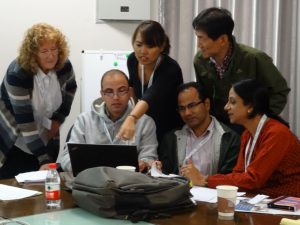
Dr. Gillian Petrokofsky, Biodiversity Institute Oxford, and trainees. Photo: Eva Schimpf, IUFRO-SPDC
The 3-day training workshop introduced participants to systematic review as a powerful tool in evidence synthesis.
The tool is used to improve decision-making and any policy formulation that draws on scientific evidence. The workshop explored examples from forestry and natural resource management.
Participants applied techniques of systematic review to develop mini-Protocols focused on how traditional knowledge forest could inform current forest management strategies/policy. Read more…
Interview with Professor Zhang Shougong, Chinese Academy of Forestry (CAF)
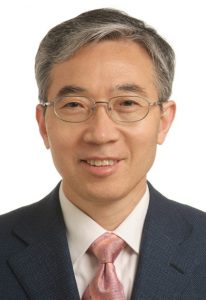
Professor Zhang Shougong, Chinese Academy of Forestry (CAF)
Keynote speaker at the IUFRO Regional Congress for Asia and Oceania –
Forests for Sustainable Development: The Role of Research
Professor Zhang, the IUFRO Regional Congress for Asia and Oceania 2016 is jointly organized by IUFRO and the Chinese Academy of Forestry. This is the first Congress of its kind to be held in the region of Asia and Oceania and will offer an extraordinary opportunity for enhancing forest science cooperation. You are one of the leading scientists in silviculture and forest management in China and have a long experience in the establishment of planted forests on the one hand, and sustainable forest management on the other hand. The Congress will particularly focus on these two areas with its themes “Planted forests for fostering a greener economy”, and “Sustainable forest management for enhanced provision of ecosystem services”. Read more…
Interview with Don Koo Lee, Professor Emeritus, Seoul National University, Republic of Korea
Keynote speaker at the IUFRO Regional Congress for Asia and Oceania – Forests for Sustainable Development: The Role of Research
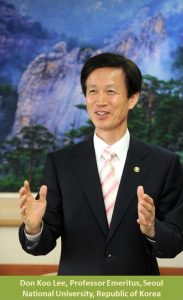 Professor Lee, the overarching theme of this IUFRO Regional Congress for Asia and Oceania is “Forests for Sustainable Development: The Role of Research”. When you gave your opening speech as President of IUFRO at the XXIII IUFRO World Congress 2010 in Seoul, you stressed the importance of sustainability, equity, growth and development and the need to understand that “Forest is our life, our hope, and our future.”
Professor Lee, the overarching theme of this IUFRO Regional Congress for Asia and Oceania is “Forests for Sustainable Development: The Role of Research”. When you gave your opening speech as President of IUFRO at the XXIII IUFRO World Congress 2010 in Seoul, you stressed the importance of sustainability, equity, growth and development and the need to understand that “Forest is our life, our hope, and our future.”
Q: What would you say has been achieved in the quest for sustainable development since the 2010 IUFRO World Congress?
A: Since then the important role of forests for life, hope and future has been further strengthened internationally by collaborative partnership activities, (e.g. co-research, advanced studies, site visits, trainings, conferences, etc.) especially in Asia, Africa and Latin America, as well as nationally by the Forest For Life National Movement in Korea. Read more…
Interview with Professor Makoto Yokohari Graduate School of Engineering, The University of Tokyo, Japan
Keynote speaker at the IUFRO Regional Congress for Asia and Oceania – Forests for Sustainable Development: The Role of Research
The Role of Forests in Urban Green Spaces
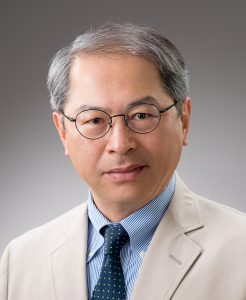
Professor Makoto Yokohari, Graduate School of Engineering, The University of Tokyo, Japan
Professor Yokohari, landscape and urban planning, urban ecology, and ecological landscape design are at the core of your academic interests. The IUFRO Regional Congress for Asia and Oceania draws attention to the particular role that forests play for the sustainable development in urban and peri-urban areas and has identified “Urban forestry for human health and community well-being” as one of its key themes.
Q: Urban green spaces have significantly gained in importance worldwide in view of rapid urbanization of society and the development of megacities. What are the major benefits of urban green spaces in general?
A: Three clusters of ecological functions, or benefits, can be listed, which are “human comfort”, “conservation of physical environment” and “conservation of biological environment”. The first cluster includes functions as landscape conservation and recreational uses, the second includes microclimate control and water retention, and the third includes conservation of ecosystems and biodiversity. Read more…
Interview with Dr Elspeth MacRae, Scion, New Zealand
Keynote speaker at the IUFRO Regional Congress for Asia and Oceania – Forests for Sustainable Development: The Role of Research
Forests and the Bioeconomy: challenges and opportunities
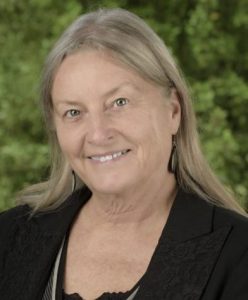
Dr. Elspeth MacRae. Scion Photo
Innovative technologies for bio-energy, bio-materials and other products will be one of the major themes at the IUFRO Regional Congress for Asia and Oceania on 24-27 October 2016 in Beijing, China. Dr Elspeth MacRae leads wood and fibre processing activities, including biorefinery, biodiscovery and bioplastics at Scion, New Zealand. Her keynote speech will highlight state-of-the-art biotech research and the role of bioproducts. Read more…
